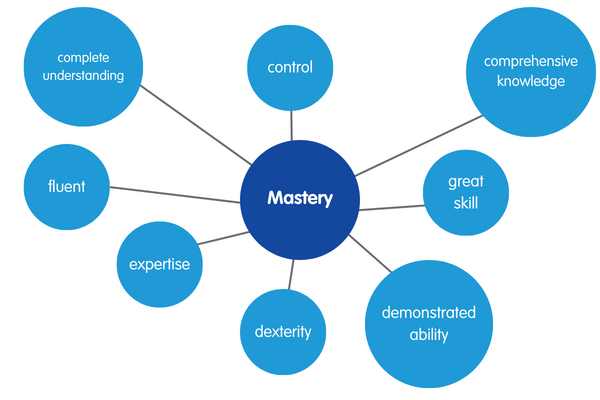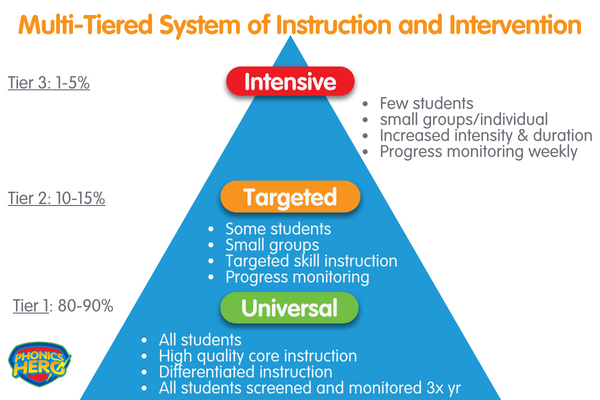
Mastery is a key goal for learning and a term that teachers often use in discussions about student performance, but definitions of what ‘mastery’ of a concept or skill means – and what it looks like – often vary between teachers. If you’re a long-time reader of my blog posts, you’ll know that phonics instruction should be systematic. Just as having a Scope and Sequence that every teacher follows is essential, a school should also have an agreed-upon definition of mastery that determines when and how students will be moved from instruction in one component of phonic knowledge to the next. In this blog, I’ll be discussing how ‘mastery’ can be defined, achieved and maintained.
Dictionary defintions of ‘mastery’ include the words and phrases in the word web below:

But how do you decide what is ‘comprehensive’, ‘great’ or ‘deep’? These are abstract concepts and hard to measure.
Researchers and research-based educators typically use a mastery criterion to determine when a skill has been acquired. That criterion makes explicit the level of performance required and the frequency of the performance required at said level. ‘Mastery’ does not imply ‘error-free’ performance, with the criterion level typically set as a percentage accuracy of between 80% and 100%. The most commonly cited level for mastery in research is 90% and the most cited frequency of performance in mastery criterion is ‘3 consecutive sessions’. So, if you want to be able to say with confidence that a student has ‘mastered’ the ‘ck’ spelling of /k/, you will need to see around 90% accuracy in spelling of words containing /k/ in 3 consecutive lessons.
 90% accuracy over 3 consecutive lessons achieved!
90% accuracy over 3 consecutive lessons achieved!
The goal of phonics instruction is for students to be able to decode and encode effortlessly so that they can be more focused on making meaning and interacting with the text.”
Moats, 1999
Students who struggle with phonics often do so because instruction has moved on before they have had a chance to master what they are currently learning. This results in learning gaps. If students are judged to have “passed” or achieved adequately at a 70% proficiency level, they are moving on to the next concept with a 30% knowledge gap. Over time, those knowledge gaps accumulate. Teaching for mastery is particularly important for students with learning challenges such as dyslexia or learners for whom English is an additional language. Mastering a skill implies a high level of automaticity. There is no longer the need to consciously think about each individual step in the process of encoding or decoding. Automaticity speeds up processing and reduces the load on working memory capacity.
As a mastery criterion suggests, mastery takes time. The concept of a ‘master’ as a highly skilled practitioner of a craft or art form dates back all the way to mediaeval Europe, where Guilds were organised so that workers could learn skills from others connected with the guild.
 A mediaeval guild pondering their craft!
A mediaeval guild pondering their craft!Members traditionally advanced through the stages of apprentice, journeyman and – finally – master. Apprenticeships (unpaid) often began at age 12 and commonly lasted from two to seven years. After finishing an apprenticeship, the worker could become a journeyman who was paid a wage. To become a master, journeymen frequently had to produce a “masterpiece” to demonstrate their skill in their trade. If the masterpiece was accepted by guild members, they could vote to accept the journeyman as a master.


In the journey to mastery of phonic skills, the student starts as a novice. This is the stage between first exposure and basic proficiency. The novice requires repeated modeling and guided practice of the skills of segmenting and blending and direct instruction in both selection of the correct letter-sound correspondences and the encoding and decoding of ‘tricky’ words. Reading and spelling are likely to be effortful and errors quite frequent in this stage.

The apprentice has basic proficiency but requires more instruction to develop the deeper understanding demonstrated in the ability to recognize and accurately choose the spelling of a particular sound (e.g., ‘c’, ‘k’ or ‘ck’ for the /k/ sound in a word). The apprentice still requires a significant amount of guidance, as well as experience.

The journeyman reads and spells with a high degree of accuracy. Prompts are rarely required, but more experience and practice in the application of skills and knowledge are needed, e.g., learning to write from dictation.

The master consistently and independently demonstrates a high level of accuracy (90%) and automaticity in spelling and reading, understands rules that apply and is able to apply skills and knowledge in the reading and writing of a variety of text types.
Some students will find the journey to phonics mastery faster and easier than others. An important principle of helping students to achieve mastery is that they be given the time they need. While all students require high-quality, whole-class research-based Tier 1 instruction in phonics, a small percentage will require additional small group or individual instruction and additional time to achieve the criterion. Consequently, I recommend a Response To Intervention approach, as shown below:
 A multi-tiered system of phonics instruction and intervention.
A multi-tiered system of phonics instruction and intervention.
I particularly like the Phonics Hero Phonics Lessons for whole-class, small group and one-to-one instruction because they facilitate differentiation for the needs of students. Teachers can change the level of difficulty in a Phonics Lesson activity (number of sounds and/or syllables in words) and turn hints on or off.
A 2-minute tour of the differentiation features in the Phonics Lessons.It is important that teachers formally Pre-test and Post-test concepts and skills they intend to teach. This testing ensures that instruction is provided at the right level for each student. It supplies the data needed for decisions about differentiation, e.g. for the student who is a complete novice or already a master. It allows the teacher to monitor progress in the learner’s journey. Phonics Hero provides a Placement Test teachers can use as a Pre-test.
A checklist for each student stating criteria and providing columns for the teacher to write in the performance level on 3 (or more) consecutive sessions is typically used in mastery learning. Ideally, the date of achievement of 90% or higher accuracy is recorded so that the rate of the journey to mastery is evident.
 An example of a simple checklist for mastery.
An example of a simple checklist for mastery.In addition to using formal assessments of phonics mastery, teachers should also confirm performance levels with observations during the reading and writing of individual words or continuous text during a lesson.
If you use the Phonics Hero Child Accounts, you also get access to in-depth reporting which colour codes how close the student is to mastery. When the children achieve 80% or higher for a particular skill, the number turns green.
 The Phonics Hero reports showing the class average scores for each level and skill.
The Phonics Hero reports showing the class average scores for each level and skill.You can see if the child has reached the criterion of mastery by drilling down into each skill to see what scores were achieved in each attempt.
 A child’s scores for each attempt at recognising the phoneme.
A child’s scores for each attempt at recognising the phoneme. So you’ve become a Master, are you one for life? Unfortunately, the answer is “No”. Once you’ve reached mastery, you have to keep using the skills and knowledge to maintain a high level of performance. Use it or lose it! Without regular practice, it is possible to slip back from Master to Journeyman or even to Apprentice – think about the ‘summer reading slump’ and the difference two months of limited reading practice makes!
Once a student has achieved mastery of phonic knowledge or skill, there should be a period of ‘maintenance’ in which that knowledge or skill is revisited regularly. Instruction should be cumulative with each step simultaneously revising and building on prior knowledge and skills in manageable increments. Research-based phonics programs (such as Phonics Hero) are always cumulative. There should be ongoing review and practice. The most effective phonics lessons start with a 5- to 10-minute review of what has previously been taught. A teacher should also conduct maintenance ‘probes’ at various intervals to determine if additional teaching of a specific concept is necessary.
Mastery is more likely to be maintained when skills and knowledge are ‘overlearned’. Phonics Hero was built to ensure that children get lots and lots of phonics practice without getting bored; each style of game is only used, on average, 1.2 times over the 26 levels. Phonics Hero’s 850 games also vary thematically: monsters, princesses, animals, superheroes and more – appealing to every child! You can set up a free 30-day trial of the Child Accounts to see what a difference the extra practice gives to your students.
I hope that this blog has provided a definition of mastery that you can use at your school and underlined the importance of achieving and maintaining that mastery in phonics instruction. As author Robert Greene put it,
Mastery is not a function of genius or talent. It is a function of time and intense focus applied to a particular field of knowledge.”